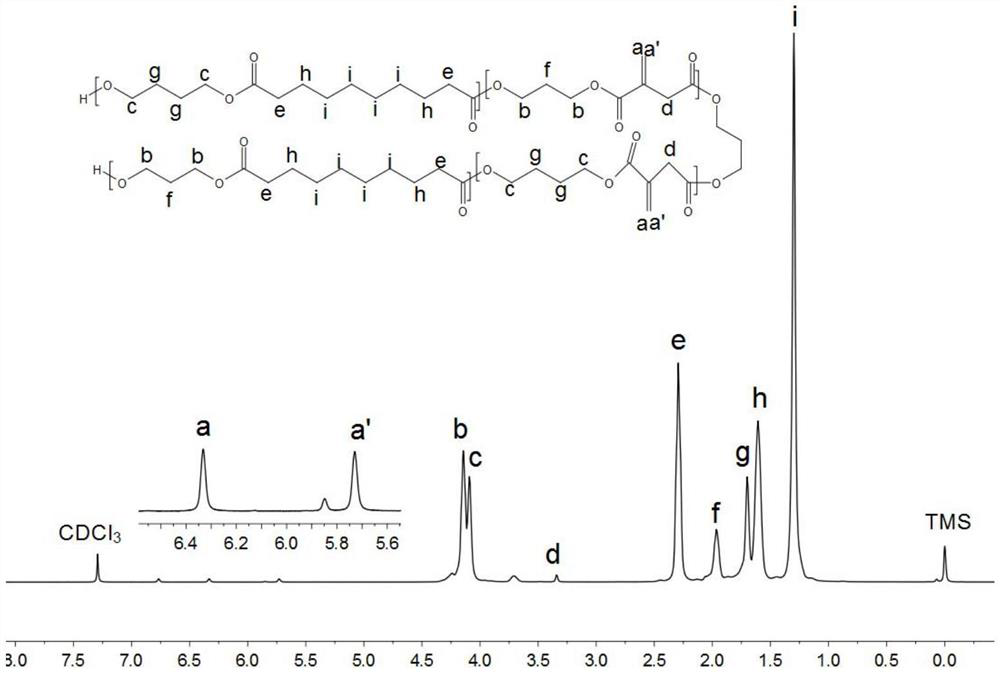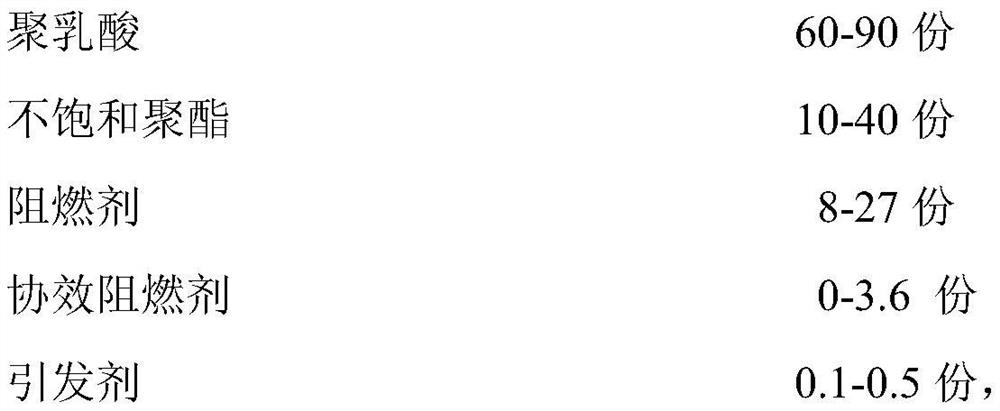A flame-retardant and toughened biodegradable polylactic acid material and its preparation method
A polylactic acid material, biodegradation technology, applied in the field of flame retardant and toughened biodegradable polylactic acid material and its preparation, can solve the problem of affecting the dispersion behavior of polylactic acid substrate and toughener, destroying the chemical structure of toughener, Destroy the toughening effect of the toughening agent and other problems, and achieve the effect of increasing the melt viscosity, stabilizing the network structure, and low price
- Summary
- Abstract
- Description
- Claims
- Application Information
AI Technical Summary
Problems solved by technology
Method used
Image
Examples
Embodiment 1
[0032] Take 16 parts of 1,3-propanediol, 13 parts of 1,4-butanediol, 5 parts of itaconic acid, and 66 parts of 1,10-sebacic acid in a three-neck flask equipped with mechanical stirring, nitrogen inlet and exhaust outlet After stirring and reacting for 4 hours at 170°C under a nitrogen atmosphere under normal pressure, inject 0.2 parts of tetrabutyl titanate as a catalyst, vacuumize the bottle until the atmospheric pressure is lower than 200Pa, slowly raise the temperature to 230°C, continue stirring for 3 hours, and then stop the reaction. The number average molecular weight of the obtained unsaturated polyester is 2.9*10 4 Da, the weight average molecular weight is 5.4*10 4 Da, molecular weight distribution is 1.9, referred to as unsaturated polyester #1.
Embodiment 2
[0034] Take 12 parts of 1,3-propanediol, 23 parts of 1,4-butanediol, 8 parts of maleic acid, and 57 parts of 1,10-sebacic acid in a three-necked flask equipped with mechanical stirring, nitrogen inlet and exhaust outlet After stirring and reacting for 4.5 hours at 175°C under a nitrogen atmosphere under normal pressure, inject 0.2 parts of tetrabutyl titanate as a catalyst, vacuumize the bottle until the atmospheric pressure is lower than 200Pa, slowly raise the temperature to 220°C, continue to stir and react for 3.5 hours, and then stop the reaction. The number average molecular weight of gained unsaturated polyester is 4.1*10 4 Da, the weight average molecular weight is 8.9*10 4 Da, molecular weight distribution is 2.2, referred to as unsaturated polyester #2.
Embodiment 3
[0036] Take 29 parts of 1,5-pentanediol, 13 parts of 1,4-butanediol, 9 parts of itaconic acid, and 49 parts of 1,8-suberic acid in three ports equipped with mechanical stirring, nitrogen inlet, and exhaust outlet. In the flask, after stirring and reacting for 2 hours at 185°C under a nitrogen atmosphere under normal pressure, inject 0.2 parts of the catalyst tetrabutyl titanate, vacuumize the bottle until the atmospheric pressure is lower than 200Pa, slowly raise the temperature to 230°C, continue to stir and react for 2 hours, and then stop the reaction. The number average molecular weight of gained unsaturated polyester is 4.3*10 4 Da, the weight average molecular weight is 9.2*10 4 Da, molecular weight distribution is 2.1, referred to as unsaturated polyester #3.
PUM
| Property | Measurement | Unit |
|---|---|---|
| yield strength | aaaaa | aaaaa |
| impact strength | aaaaa | aaaaa |
| yield strength | aaaaa | aaaaa |
Abstract
Description
Claims
Application Information
 Login to View More
Login to View More - R&D
- Intellectual Property
- Life Sciences
- Materials
- Tech Scout
- Unparalleled Data Quality
- Higher Quality Content
- 60% Fewer Hallucinations
Browse by: Latest US Patents, China's latest patents, Technical Efficacy Thesaurus, Application Domain, Technology Topic, Popular Technical Reports.
© 2025 PatSnap. All rights reserved.Legal|Privacy policy|Modern Slavery Act Transparency Statement|Sitemap|About US| Contact US: help@patsnap.com



